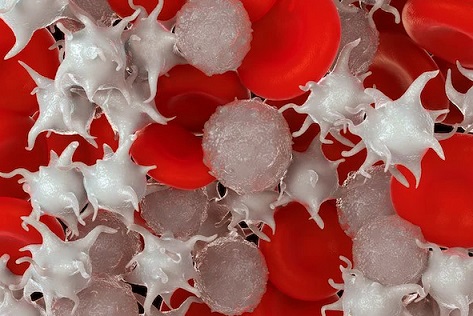Polish Study Finds That COVID-19 Causes a Complex Pattern of Platelet Activation and Reactivity
Nikhil Prasad Fact checked by:Thailand Medical News Team Dec 25, 2024 3 months, 3 days, 7 hours, 28 minutes ago
Medical News: The COVID-19 pandemic, caused by the SARS-CoV-2 virus, has been associated with a range of complications beyond respiratory issues. One area of growing interest is how the virus impacts blood platelets, which play a crucial role in clotting and maintaining vascular health. A study by researchers from the Department of Hemostasis and Hemostatic Disorders at the Medical University of Lodz in Poland sheds light on how COVID-19 induces a complex pattern of platelet activation, reactivity, and dysfunction.
 Polish Study Finds That COVID-19 Causes a Complex Pattern of Platelet Activation and Reactivity
Polish Study Finds That COVID-19 Causes a Complex Pattern of Platelet Activation and Reactivity
This
Medical News report delves into the key findings of the study, highlighting the intricate ways in which SARS-CoV-2 interacts with platelets, leading to thrombotic complications. Understanding these interactions is critical for developing effective treatments and preventive strategies.
Platelet Activation and Reactivity in COVID-19
Platelets are small cell fragments in the blood that are central to clot formation and wound healing. However, in COVID-19 patients, platelets exhibit abnormal behavior that can contribute to life-threatening conditions such as deep vein thrombosis, pulmonary embolism, and stroke.
Researchers found elevated levels of soluble markers of platelet activation, such as P-selectin and platelet factor 4 (PF4), in COVID-19 patients. These markers indicate that platelets are being activated excessively. Furthermore, platelets isolated from these patients demonstrated heightened reactivity to common agonists like collagen and thrombin. This hyperreactivity was especially pronounced in patients with severe disease.
Interestingly, the study also reported conflicting findings in some cases. For example, analysis of whole blood revealed reduced activation of the fibrinogen receptor (GPIIb/IIIa), a critical component for platelet aggregation. This paradox suggests a dual mechanism involving both hyperactivity and exhaustion of platelets in different phases of the disease.
The Role of the SARS-CoV-2 Virus
SARS-CoV-2’s impact on platelets appears to be multifaceted. Some researchers propose that the virus directly interacts with platelets through its spike protein. The study showed that SARS-CoV-2 viral RNA and proteins were detected in the platelets of infected individuals, indicating possible direct viral entry.
Interestingly, the spike protein’s interaction with platelet receptors may amplify activation pathways. However, other studies suggest that indirect factors, such as inflammatory cytokines, immune complexes, and extracellular vesicles, play a more significant role in altering platelet function.
The study also pointed out that the presence of SARS-CoV-2 elements in the bloodstream correlates with disease severity. This finding highlights the need to understand the role of circulating viral components in platelet dysfunction and thrombosis.
Methods for Studyi
ng Platelet Behavior
To better understand these changes, researchers employed various methods:
-Flow Cytometry: Used to measure surface markers like P-selectin and activated GPIIb/IIIa. This method also identifies platelet-derived extracellular vesicles that contribute to thrombosis.
-Light Transmission Aggregometry (LTA): Assessed platelet aggregation in response to agonists such as collagen, ADP, and thrombin.
-Enzyme-Linked Immunosorbent Assays (ELISA): Measured soluble markers in plasma, such as PF4 and sP-selectin, providing insights into the systemic effects of platelet activation.
Each method provided unique insights, revealing how platelets respond under different conditions and in the presence of SARS-CoV-2 components.
Platelet Dysfunction and Thrombosis
One of the study’s significant findings is the role of platelet-derived extracellular vesicles (EVs) in promoting thrombosis. These vesicles carry pro-inflammatory and pro-thrombotic factors, exacerbating the risk of clot formation. Elevated levels of these vesicles were observed in COVID-19 patients, particularly those with severe disease.
Additionally, cytokines released during the infamous “cytokine storm” associated with severe COVID-19 amplify platelet activation. Cytokines such as interleukin-6 and tumor necrosis factor-α increase the expression of adhesion molecules on the platelet surface, further promoting clot formation. Platelets also form aggregates with white blood cells, such as neutrophils and monocytes, creating a pro-thrombotic environment.
The study also highlights persistent platelet dysfunction in patients recovering from COVID-19. Even weeks or months after the acute phase, platelet hyperactivity was observed in some individuals, contributing to long COVID symptoms. This prolonged activation could be linked to lingering inflammation, residual viral components, or immune dysregulation.
In long COVID cases, the sustained hyperactivity of platelets may contribute to persistent symptoms such as fatigue, shortness of breath, and clotting abnormalities. This finding underscores the importance of monitoring platelet function in recovered patients, especially those with a history of severe disease.
Therapeutic Implications
Despite the clear role of platelets in COVID-19 complications, standard antiplatelet therapies like aspirin and clopidogrel have shown limited success. This inefficacy may stem from the complex interplay of direct viral effects, immune activation, and cytokine release.
The study suggests that a combination of targeted therapies might be required. Potential strategies include:
-Anti-inflammatory Treatments: Reducing cytokine levels to limit platelet hyperactivation.
-Platelet-Specific Inhibitors: Targeting specific receptors or pathways involved in SARS-CoV-2-induced platelet dysfunction.
-Anticoagulants: Preventing clot formation without excessively inhibiting normal platelet function.
Conclusions
The study provides valuable insights into how COVID-19 affects platelet behavior. The findings underscore the dual nature of platelet dysfunction - marked by both hyperactivity and exhaustion - and its significant contribution to thrombotic complications. This duality presents challenges in treatment, as interventions must address both excessive activation and impaired functionality.
Future research should focus on identifying specific pathways involved in platelet activation during COVID-19. Targeting these pathways could lead to more effective therapies that mitigate thrombotic risks without compromising overall hemostatic function. Additionally, long-term monitoring of platelet function in recovered patients is essential for managing post-COVID complications.
The study findings were published in the peer-reviewed International Journal of Molecular Sciences.
https://www.mdpi.com/1422-0067/26/1/49
For the latest COVID-19 News, keep on logging to Thailand
Medical News.
Read Also:
https://www.thailandmedical.news/news/platelets-and-t-cells-in-covid-19-recovery
https://www.thailandmedical.news/news/is-platelet-activating-factor-the-key-link-between-covid-19-and-atherosclerosis-risk
https://www.thailandmedical.news/news/caffeine-s-surprising-benefits-on-heart-health-and-blood-platelets
https://www.thailandmedical.news/news/covid-19-viral-sepsis-unveiling-the-hidden-dangers-of-coagulation-and-platelet-dysfunction
https://www.thailandmedical.news/news/herbs-and-phytochemicals-1-8-cineole-from-eucalyptus-is-a-natural-antithrombotic-agent
